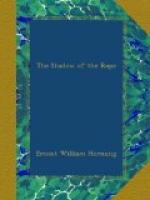Everybody was buying the damp, pink sheets. Rachel actually bought one herself; and overheard the opinion of the man in the street without a pang. So she might think herself lucky! But she did, she did; in the reaction that had come upon her with the first mouthful of raw air, in the intoxication of treading the outer world again, she thought herself the luckiest woman in London, and revelled rather than otherwise in the very considerations which had appalled her in the precincts of the court. How good, after all, to be independent as well as free! How great to drift with the tide of innocent women and law-abiding men, once more one of themselves, and not even a magnet for morbid curiosity! That would come soon enough; the present was all the more to be enjoyed; and even the vagueness of the immediate future, even the lack of definite plans, had a glamor of their own in eyes that were yet to have their fill of street lamps and shop windows and omnibuses and hansom cabs.
The policeman under the bridge was a joy in himself; he refreshed Rachel’s memory as to the way, without giving her an unnecessary look; and he called her “madam” into the bargain! After all, it was not every policeman who had been on duty at the Old Bailey, nor one in many thousands of the population who had gained admission to the court.
Yet if Rachel had relieved the tedium of her trial by using her eyes a little more; if, for example, she had condescended to look twice at the handful of mere spectators beyond the reporters on her right, she could scarcely have failed to recognize the good-looking, elderly man who was at her heels when she took her ticket at Blackfriars Bridge. His white hair was covered by his hat, but the face itself was not one to be forgotten, with its fresh color, its small, grim mouth, and the deep-set glitter beneath the bushy eyebrows. Rachel, however, neither recognized nor looked again.
In a few minutes she had a better chance, when, having entered an empty compartment in the first class, she was joined by this gentleman as the train began to move.
Rachel hid herself behind the newspaper which she had bought, not that she had looked twice at her companion, but because at such close quarters, and in the comparatively fierce light of the first-class compartment, she was terribly afraid that he might look once too often at her. But this fear passed from her in the matchless fascination of reading and re-reading five words in the stop-press column:—“Minchin case—Verdict, Not guilty.”
Not guilty! Not guilty! And to see it in print! Her eyes filled at the sight, and she dried them to gloat again. There were columns and columns about the case, embellished with not unskilful sketches of counsel addressing the jury, and of the judge in the act of summing up. But Rachel had listened to every word from all three; and the professional report was less full and less accurate than the one




